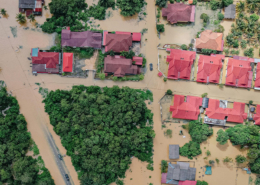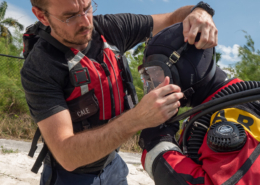How to Recognize When You May Need Stress Crisis Counseling
By: Pastor Ray Wickham
It’s that call we may someday experience. Your team has been assigned to locate a young girl who was kidnapped/murdered by a suspect. He has agreed to a plea bargain in exchange for the location of the body, which is a local lake.
As you complete the second sweep of the assumed target area, you catch a glimpse of an arm. Your heart skips a beat and you signal the surface tender. When you draw closer, the arm is attached to a youngster that reminds you in a flash of the daughter you kissed goodbye as you left for this call early in the day. A few days later, after the reports are filed and the story leaves center stage, you are left with raw emotions and a troubled state of mind. You have read about it, but you suspect (or fear) that you are about to join the numbers of those who have experienced PTSD.
Depression is commonly referred to as the “common cold” of mental illness.
If that is the case, then Post Traumatic Stress Syndrome (PTSD) is the common cold of public safety workers. It is estimated that 7.8 % of Americans will experience PTSD in their lifetimes. That equals 5 million people a year on average. We all know someone affected by PTSD. The purpose of this article is to help the reader and others make the all-important choice of when to seek specialized help for this sinister malady.
When thinking about PTSD, one imagines the traumatized soldier who hears helicopter blades in the ceiling fan. But not everyone with PTSD has been through a dangerous event. Some people develop PTSD after a friend or family member experiences danger or harm. I would add, being present at the death of someone, or seeing a dead body, especially young person can contribute.
It has been commonly agreed by professionals in this field that some of the common symptoms of PTSD are as listed below:
- You’ve suffered a trauma and you can’t seem to stop thinking about it
- Everything you feel is intense
- You can’t do the things you like to do.
- You have unexplained and recurrent headaches, stomach-aches or a rundown immune system
- Your relationships are strained
- Abusing drugs, alcohol, food or sex to cope.
- Feeling sad, angry or otherwise “not yourself.”
This is not an exhaustive list of indicators that a person may exhibit if he/she has PTSD, but it is a good checklist to use when you begin asking the question of whether or not an outside source should be consulted for your condition. (Note: all symptoms may not be present and PTSD is still strongly indicated. As some of us say, if you are looking at the list and taking an inventory, you have probably already answered the question as to whether or not you need an outside resource to speed your recovery)
People with spotless teeth still go to the dentist, so why shouldn’t we take our mental health just as seriously? If you find yourself in a stage of life as described, then this might be the time you’re actually most receptive to working with a mental health professional. Taking the jumbled mess of thoughts that are always there in your head and speaking them out loud can keep minor symptoms and unhealthy behaviors from spiraling into something more serious when times get stressful.
Many people who experience PTSD are hesitant to seek help. Psychologists attribute this low rate of treatment to the stigma and many myths attached to seeing a therapist. Among them, the concern that only “crazy” people need therapy, that accepting help is a sign of weakness, or that the treatment options will be time-consuming and expensive. None of these are true. In fact psychologist Daniel J. Reidenberg says “The earlier someone gets help, the easier it is to get through the problem. There will be less time and less strain and stress involved in the process.”
So why seek help? Studies have shown that counseling:
- helps teach about trauma and its effects,
- allows a person learn to use relaxation and anger-control skills,
- provide tips for better sleep, diet, and exercise habits,
- helps people identify and deal with guilt, shame, and other feelings about the event that led to PTSD.
There are many resources available for veterans, public safety workers, and others who feel they need help with this issue, let me suggest a few:
- https://www.ptsd.va.gov/public/where-to-get-help.asp
- (some of the advice from this site: Make sure the provider has experience treating people who have experienced a trauma.
- Try to find a provider who specializes in evidence-based medications for PTSD or effective psychotherapy for PTSD (e.g., cognitive behavioral therapy (CBT); Cognitive Processing Therapy (CPT); prolonged exposure therapy (PE); or eye movement desensitization and reprocessing (EMDR)).
- Find out what type(s) of insurance the provider accepts and what you will have to pay (out-of-pocket costs) for care.
- A local minister or other clergy or chaplain on your team that has experience in treating PTSD.
- All VA Medical Centers provide PTSD care, as well as many VA clinics.
And as always, if you are feeling suicidal or extremely depressed, immediately call 911. It could save a life… maybe yours!
Try to remember that public safety dive personnel serve their communities. They volunteer to take on tasks and objectives that most people cannot fathom. The operations they perform should not involve ego or bravado that prevent a diver or team member from seeking and obtaining support. In the modern public safety community, support is often an after-thought. If your team does not have a support structure in place for personnel, begin to seek out assets and avenues that can be available before they are needed. Do your best to avoid making team member care something that has never been discussed when it may already be needed.
-Pastor Ray Wickham – Instructor, Air Hogs Scuba, Clayton, NC
Senior Pastor, New Horizons Fellowship, Apex, NC


 Photo By: Defense Visual Information Distribution Service
Photo By: Defense Visual Information Distribution Service


 Y. ZIN
Y. ZIN


Skriv en kommentar
Vil du deltage i diskussionen ?Du er velkommen til at bidrage !